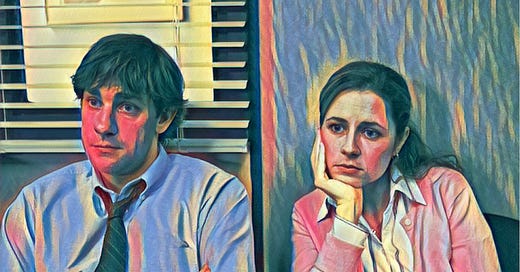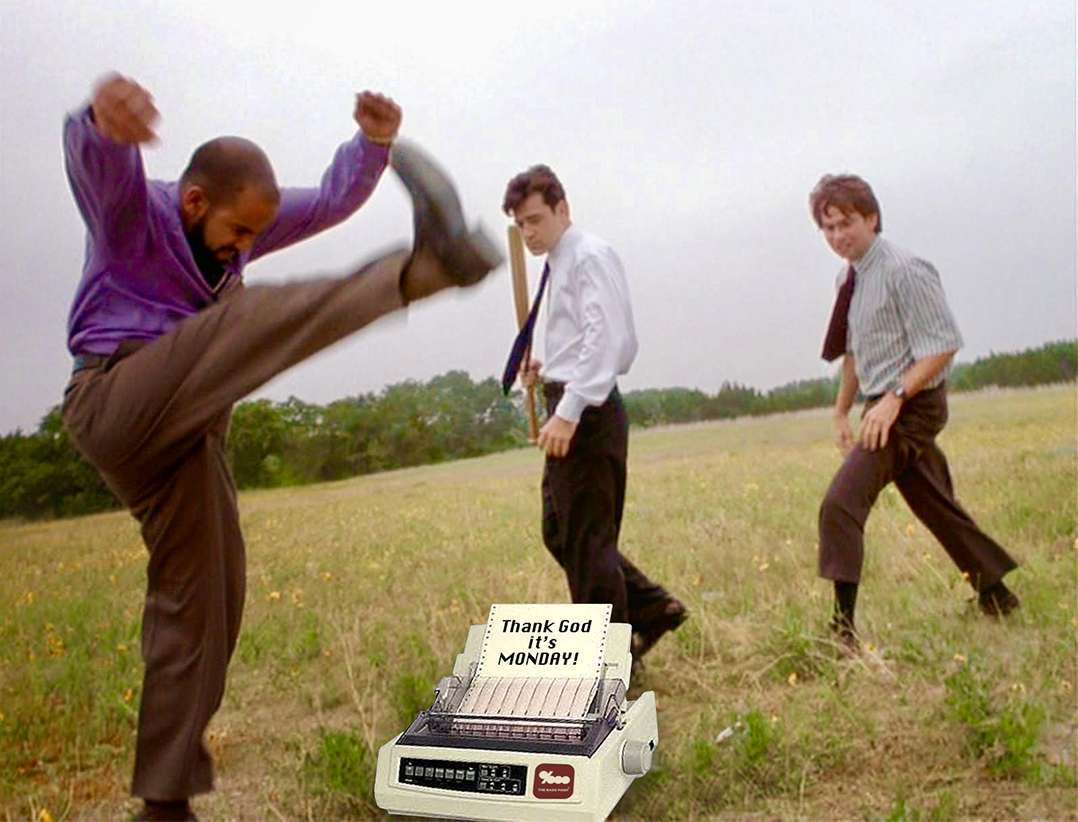In praise of working from home
How my life changed with it, and why the push back makes no sense
As a typical millennial, I wanted to work for something I believed in. My goal was to make a difference.
Marine biology is my field of training, and I have always been passionate about environmental conservation. I wanted to "save the world," so to speak, or more specifically, save the oceans.
A young person has little experience, but a lot of energy. Combine that with a cause to pursue, and we will work extremely hard for it. We will change cities, leave friends and family behind, and work long hours, or in dangerous settings. Even in the epicenter of the militia in Brazil. Yeah, we will do anything.
That's an ideal recipe for abuse.
Abuse followed. I had many difficult experiences at work, but none of them were as severe as when I worked for a big international environmental NGO. I suffered constant harassment and gaslighting. That led to depression. During that year, I would be in bed the whole weekend most weekends, in some kind of sleeping trance. I completely lost sense of time and had suicidal thoughts every day.
Around the same time, one of my friends, also a biologist, was sexually harassed at her workplace. Her boss would constantly ask her out, and when she started pushing back, he told her he only hired her because she was pretty. He soon started treating her poorly and making her life miserable. She is one of the nicest and most dedicated people I know, and she was devastated.
Things turned around for her and me, but I still had experiences that I'd preferred not to have in other offices. And my drive to work in ocean conservation never returned—something I still grieve over from time to time.
Offices can be extremely toxic places. From harassment to micro and macro racism and extreme competition. In this Buzzfeed article, for instance, a black woman reported having people raise their fists or say “nice statement” when they saw her with her natural hair (an afro)—or having to constantly worry about her behavior at work so she wouldn't be seen as an angry black woman. When she was at home during the pandemic, she reported that she could finally be herself and let her hair be as it is. Clearly, it's understandable why a survey found that 66% of black people didn't want to return to the office from 9 to 5.
Even in a safe environment, spending eight or more hours a day, every day, with people you haven’t met before is not an easy feat. It's no surprise then that most of us thrived during the pandemic and didn't want to go back to how things were.
Despite the push from companies and thousands of news articles saying "city centers are dying," or blaming workers for their choices, there is no sign that 100% office time will ever return.
The fact that most people didn’t want to come back to the office, especially women, mothers, people of color, and with disabilities, shows that the office has never been that comfortable for us all to start with.
Pay gap
Although it's not such a hot topic anymore, Covid's impact on the workplace has been much discussed. Some news outlines would cast working from home in a more positive light, but most, especially as the years passed, were highly negative and even fear-mongering.
Those discussions were repetitive, especially when showcasing the negative points of working from home. Other than the already well-known “keeping the company's culture,” there was always someone pointing out that the salary gap between women and men may increase because women prefer working from home. Women were reported to be even willing to leave well-paying jobs if it meant a more flexible schedule.
According to articles and newscasts, managers tend to promote at-work workers more than those away from the office. That, in turn, will lead to widening salary gaps between those who will mostly be at the office and get promoted and the rest of us. This will also diminish diversity in offices since most women, moms, people of color, and the disabled prefer working from home.
But should people who work from home be penalized for wanting that? And shouldn't it be the company's interest and sole responsibility to increase diversity and diminish salary gaps? Were we even diverse or had we improved diversity in offices before 2020? Can we do that by simply showing up?
It never fails to baffle me how everything wrong that happens (or can potentially occur) can always be blamed on the individual level. If you think about it for a few minutes, it doesn't make any sense at all.
Let’s start with the fact that managers are already inclined to promote white, straight, cisgender men. Not only promote but also hire. Most places lack diversity, sometimes to an extreme.

It is well known that mothers already received sideways glances and were not considered for positions due to their small children before the pandemic. Sometimes, even wanting to get pregnant can be used as an excuse for not hiring. Having flexibility and working from home is perfect for parents with young children who need to constantly face problems such as a child being sick or needing to be picked up from school early.
Countries and companies vary in their level of protection against sexual harassment. However, mansplaining, taking credit for our work, low salaries for the same job, and not being taken seriously are pretty much everywhere.
And people of color and from different nationalities often cannot even get their foot in the door. Putting everyone back in the office will hardly change those realities. It will only make daily life harder for those who endure it.
We shouldn't be blamed for choosing remote
Although I'm completely in favor of working from home, I agree that meeting personally from time to time is important. Also, although there are many people that I've worked with who I'm extremely grateful that I don't have to ever see their faces again, I did make some good friends at former workplaces.
What I'm most upset about is how the discourse over choosing to work from home has been filled with blame for minorities. Especially how the pay gap is used to manipulate by saying that if we don't want to return, we will widen it in the long run.
I don’t think blaming us for not wanting to return makes sense. The pay gap has always been there, and most statistics show that, unfortunately, it will stay there long after I retire—for 135 years to be exact.
It's not in our hands to narrow the pay gap. It never was. At least not by working in the office or working more. It's not as if we could all just work harder, work long hours in the office, and finally diminish pay differences. Even if more women are in the workforce and being promoted, in the long run, this can diminish the gap to some extent, but not enough. And can't we just be promoted nonetheless if the work is good?
CEOs and managers are the ones that can really change the office's "culture." Make offices feel safer, more open, and more understanding of people's needs. Make sure everyone gets fair payments, no matter their gender, sexuality, or skin color. Give people autonomy and the freedom to decide how to do things. At least having a boss who understands that work is not everything in life already goes a long way.
And I don't think it's worth spending most of your life in an environment and situations that make you mentally ill. Especially if you can work as productively or more from anywhere you want thanks to this amazing thing called: the internet.
Offices are not for introverts
As an introvert, I love working from home. Having my own time to work thoroughly on an activity that demands attention without being interrupted. Besides, more time to think and recharge.
I'm not alone. Most introverts excel at working from home. In general, introverts pay a price for each social interaction throughout the day, and we recharge by being alone. Neuroscience supports the theory. Extroverts are less sensitive to dopamine, so they require more stimulation to feel adequately energized. On the other hand, over-stimulation can quickly exhaust introverts, whose brains are far more sensitive to the chemical.
I hated working in an office. The constant worry about how people perceive you—if they like you, if they think you are productive or not. Everything you say weighs more. I despised office politics, clicks, and gossip. Thankfully, during the pandemic, I finally got a remote job, and it changed my life for the better. Now that I'm a freelancer, I'm hoping to never turn back.
Life is more than work. Working from home was the first time I felt a healthy bond with work. The lack of commuting gave me more time to pursue writing. At least from afar, my colleagues are all kind, helpful, and polite. I do not have to worry about office politics anymore. I will never really know who dislikes who or what my boss is doing wrong in their views. I can finally focus on the only thing that really matters: doing my work well.
And if companies truly want more diversity, they are the ones that should be more understanding and make special efforts to diminish the pay gap. More policies should also be in place to protect those wanting to work from home. After all, the office has never been a safe place for any of us to start with, and it probably won't be any time soon.
The Devil Wears Prada by Lauren Weisberger.
Working for the devil herself can only mean that the work was hell. Andrea Sachs, a small-town girl fresh out of college, lands the job “a million girls would die for"—hired as the assistant to Miranda Priestly, the high-profile, fabulously successful editor of Runway, the world's biggest fashion magazine. The book shows how glamour and money aren't really worth enduring a hellish job.
Office Space (1999).
Peter has a job that he hates: coding bank software in an office cubicle. One day his girlfriend takes him to a hypnotist, and something inside him changes. He starts not caring about his job and acting like it.
As a result, he does cathartic things that anyone who has ever worked would love to do. My favorite scene is them destroying the printer.
The Office (I think it's not on Netflix in all countries).
I recently started to watch The Office (I'm around S2). In spite of the show's funny moments, I haven't been as taken by it as many fans are. It reminds me of this German word, fremdschämen, which means “a feeling of embarrassment from observing the embarrassing actions of another person.” It is not exactly my kind of comedy, but there are nine seasons, so maybe it will turn around.













I had the same feeling when I started The Office! I can tolerate certain levels of fremdschämen but this was too uncomfortable, so I only watched a view episodes... Also yes to everything you said about systemic change instead of blaming individuals.